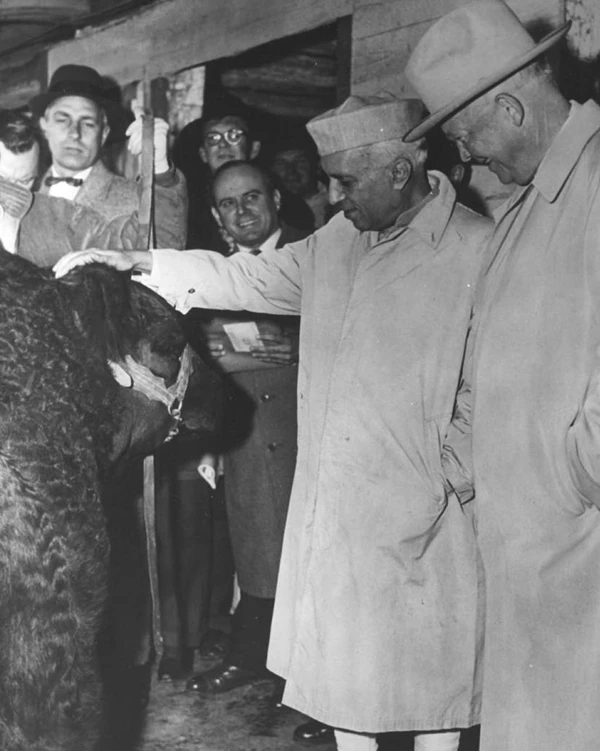Last updated: July 22, 2022
Person
Prime Minister Jawaharlal Nehru

Eisenhower NHS Photo
Jawaharlal Nehru was born on November 14, 1889, in Allahabad, India. He was leader of India’s nationalist movement and India’s first prime minister after independence (1947-1964).
Nehru was educated at home until age 16 and then continued his education in England at the Harrow School and later at Trinity College in Cambridge, where he earned a degree in natural science. He then studied law at the Inner Temple in London before returning to India in 1912 where he practiced law until 1919.
In 1919, Nehru became aware of the Jallianwala Bagh massacre. The massacre, also known as the Massacre of Amritsar, was an event in which 379 innocent people were killed and at least 1,200 wounded when the British army continuously fired for ten minutes on a crowd of unarmed Indians. The incident changed Nehru's life. In concert with his father, Motilal Nehru, Jawaharlal devoted himself to the struggle for India’s independence from the British Empire.
During the Non-Cooperation Movement (1920-22) led by Mahatma Gandhi, Nehru was imprisoned for the first time for activities against the British government. Over the next two and a half decades, he spent a total of nine years in jail. Given his compelling oratory and close association to Gandhi, he was elected president of the Indian National Congress in 1929. From 1930 to 1936, Nehru was in jail for conducting civil disobedience campaigns.
During World War II, Nehru desired to support the Allied war effort. However, Nehru’s views on the war differed from those of Gandhi. Initially, Gandhi believed that whatever support was given to the British should be given unconditionally and that it should be of a nonviolent character. Nehru held that nonviolence had no place in defense against aggression and that India should support Great Britain in a war against Nazism but only as a free country.
Nehru was imprisoned nine times during WWII over involvement in actions related to support for Indian independence from Great Britain. He was released from his last detention on June 15, 1945.
In 1946, Nehru joined India’s interim government as deputy prime minister (the British viceroy being considered prime minister) and minister of external affairs. From India’s independence in 1947 until his death, Nehru continuously held the posts of prime minister and minister of external affairs. In 1947, despite his reservations, Nehru acquiesced to the Muslim League’s plan to divide India, and in August 1947, Pakistan was created - Pakistan being primarily Muslim and India predominantly Hindu.
Nehru’s name is associated with the development and implementation of the basic principles of the internal and foreign policy of the Republic of India, which have been referred to as the “Nehru course.” Chiefly, he oversaw India's transition from a colony to a republic, while nurturing a plural, multi-party system.
Starting in the late 1940s, both the United States and the U.S.S.R. began seeking out India as an ally in the Cold War. However, Nehru, led a “non-alignment policy”, by which India and other nations wouldn’t feel the need to tie themselves to either country in order to thrive. Therefore, Nehru is considered a founder of the Non-Aligned Movement (NAM) of nations professing neutrality.
Prime Minister Nehru visited the United States in late 1956, arriving in Washington D.C. on December 16. On the following morning, President Eisenhower met him at the Blair House and together they drove to Eisenhower’s Gettysburg farm. Nehru’s visit to the farm was the first of a foreign leader and was carefully fitted into the official itinerary. Together they spent that day and part of the next in some fourteen hours of conversation. During the visit, Nehru became the only world leader to stay overnight at the farm as part of his visit during the Eisenhower administration.
On December 18th, Nehru and Eisenhower returned to Washington. Nehru went to the White House the next morning and they continued private talks. In the end, President Eisenhower had made fourteen pages of notes on their conversations.
Some of the topics discussed during the visit addressed India’s neutrality, socialism, and the way the “third world” viewed the actions of the President of the United States. More specifically, what was the Indian government’s stance on the U.S. actions during the Hungarian Revolt and the Suez Crisis? Prime Minister Nehru was an information conduit for President Eisenhower on how "third world" nations viewed the West.
In his memoir Waging Peace 1956-1961, President Eisenhower stated that he liked Prime Minister Nehru and that he deeply sympathized with the problems that Chinese aggression had caused India. He believed that Nehru sincerely wanted to help the Indian people and lead them to higher levels of living and opportunity. He thought it fair to conclude that Nehru was essential to India.
